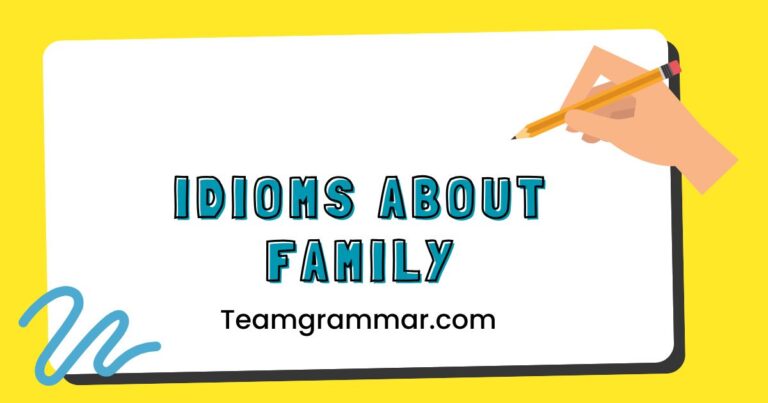33 Idioms for Getting Married: A Comprehensive Guide
Understanding idioms related to marriage is essential for anyone learning English, as these expressions frequently appear in conversations, literature, and media. Mastering these idioms not only enhances your comprehension but also allows you to express yourself more colorfully and naturally when discussing relationships and marriage.
This guide is designed for English language learners of all levels who wish to deepen their understanding of idiomatic expressions related to marriage and improve their overall fluency and cultural literacy.
Table of Contents
- Introduction
- Definition of Idioms
- Structural Breakdown of Marriage Idioms
- Types and Categories of Marriage Idioms
- Examples of Marriage Idioms
- Usage Rules for Marriage Idioms
- Common Mistakes When Using Marriage Idioms
- Practice Exercises
- Advanced Topics: Nuances and Cultural Context
- Frequently Asked Questions
- Conclusion
Definition of Idioms
An idiom is a phrase or expression whose meaning cannot be understood from the ordinary meanings of the individual words. It is a fixed expression with a figurative meaning that differs significantly from the literal meaning.
Idioms are a fundamental part of the English language, adding color, depth, and nuance to communication. They are classified as a type of figurative language, and their function is to convey complex ideas or emotions in a concise and memorable way.
In the context of marriage, idioms are used to describe various stages and aspects of the relationship, from courtship to the wedding ceremony and the married life that follows. Understanding these idioms requires familiarity with the cultural connotations and historical context that often shape their meanings.
For instance, an idiom like “tie the knot” doesn’t literally involve tying anything, but it figuratively represents the act of getting married.
Structural Breakdown of Marriage Idioms
Marriage idioms, like all idioms, are structurally fixed expressions. This means that their word order and composition are generally inflexible.
Altering the structure of an idiom can change its meaning or render it nonsensical. Most marriage idioms consist of a verb and a noun, or a verb and a prepositional phrase.
The structural elements combine to create a figurative meaning that is distinct from the literal interpretation of the individual words.
For example, consider the idiom “take the plunge.” Structurally, it consists of the verb “take” and the noun phrase “the plunge.” The literal meaning of taking a plunge might refer to diving into water. However, in the context of marriage, it means to make a decisive commitment, specifically to get married.
The structural integrity of this idiom is crucial; changing it to “make the plunge” is acceptable but altering it further would likely diminish its effect.
Types and Categories of Marriage Idioms
Marriage idioms can be categorized based on the stage of the relationship they describe. These categories include idioms related to courtship and engagement, wedding preparations, the wedding ceremony itself, marital life, and the challenges or successes within the marriage.
Each category reflects distinct aspects of the journey towards and through marriage.
Courtship and Engagement Idioms
These idioms describe the initial stages of a relationship, including falling in love, dating, and proposing marriage. They often convey excitement, anticipation, and the deepening of commitment between two people.
Wedding Preparation Idioms
These idioms are used to describe the planning and arrangements that lead up to the wedding day. They often reflect the busyness, stress, and joy associated with organizing a wedding.
Marital Life Idioms
These idioms describe the experiences and challenges of married life. They can refer to the joys of companionship, the difficulties of conflict, or the long-term commitment required to sustain a marriage.
Examples of Marriage Idioms
Understanding marriage idioms requires seeing them in context. The following sections provide extensive examples of idioms categorized by the stage of a relationship, from courtship to long-term commitment.
Popping the Question
This category includes idioms related to proposing marriage. These expressions often capture the nervousness, excitement, and hope associated with asking someone to marry you.
The following table provides examples of idioms related to proposing marriage, along with their meanings and example sentences.
| Idiom | Meaning | Example Sentence |
|---|---|---|
| Pop the question | To propose marriage | He finally popped the question on their anniversary. |
| Ask for someone’s hand in marriage | To ask someone to marry you, often seeking permission from their family | He decided to ask for her hand in marriage after dating for five years. |
| Take the plunge | To make a decisive commitment, specifically to get married | After much thought, they decided to take the plunge and get married. |
| Get hitched | To get married | They are planning to get hitched next summer. |
| Tie the knot | To get married | They decided to tie the knot in a small, intimate ceremony. |
| Walk down the aisle | To get married | She always dreamed of the day she would walk down the aisle. |
| Say “I do” | To get married | They were so happy when they finally got to say “I do”. |
| Seal the deal | To finalize an agreement or commitment, in this case, marriage | They sealed the deal with a beautiful wedding ceremony. |
| Head to the altar | To get married (often implies a religious ceremony) | After dating for several years, they are finally heading to the altar. |
| Become man and wife | To get married | They were excited to become man and wife in front of their family and friends. |
| Make an honest woman of her | An old-fashioned idiom meaning to marry a woman you’ve been in a relationship with | He decided it was time to make an honest woman of her after all these years. |
| Put a ring on it | To propose marriage, symbolized by giving a ring | He knew she was the one, so he decided to put a ring on it. |
| Propose to | To ask someone to marry you | He plans to propose to her during their vacation. |
| Get engaged | To become formally promised to be married | They got engaged last Christmas and are now planning the wedding. |
| Set a date | To decide on a date for the wedding | They set a date for their wedding next spring. |
| Plan the big day | To organize and arrange all aspects of the wedding | They’re busy planning the big day with all their friends and family. |
| Start a new chapter | To begin a new phase in life, such as marriage | Getting married means they’re starting a new chapter together. |
| Start a life together | To begin living as a married couple | They’re excited to start a life together in their new home. |
| Take her as his wife | To formally marry someone | He was proud to take her as his wife in the presence of their loved ones. |
| Make it official | To formalize a relationship through marriage | They decided to make it official after dating for many years. |
| Find your soulmate | To discover the person you are meant to be with | He felt that he had finally found his soulmate. |
| Fall head over heels | To fall deeply in love | They fell head over heels for each other. |
| Have eyes for | To be attracted to someone | He only has eyes for her. |
| Sweep someone off their feet | To charm someone quickly and completely | He swept her off her feet with his romantic gestures. |
Wedding Preparation
This section includes idioms that describe the process of planning and preparing for a wedding. These idioms often convey the hectic nature of wedding planning, as well as the excitement and anticipation surrounding the event.
The following table provides examples of idioms related to wedding preparations, along with their meanings and example sentences.
| Idiom | Meaning | Example Sentence |
|---|---|---|
| Have cold feet | To be nervous or apprehensive about something, especially marriage | He had cold feet the night before the wedding. |
| A match made in heaven | A relationship that is perfectly suited | Everyone said they were a match made in heaven. |
| Blushing bride | A happy, radiant bride | The blushing bride looked stunning in her white dress. |
| Tie up loose ends | To finalize all remaining details before the wedding | They worked hard to tie up loose ends before the big day. |
| Go through the roof | To increase dramatically, often referring to wedding costs | The wedding costs went through the roof. |
| Shell out | To spend a lot of money, especially unwillingly, on wedding expenses | They had to shell out a lot of money for the venue. |
| Foot the bill | To pay for something, especially the wedding expenses | Her parents generously offered to foot the bill for the wedding. |
| Hitched for life | Married forever | They’re hitched for life and couldn’t be happier. |
| On cloud nine | Extremely happy, often about getting married | She was on cloud nine after the proposal. |
| The happy couple | The bride and groom | The happy couple danced the night away. |
| Big day | The wedding day | Everyone is excited for their big day. |
| Wedding bells | The sound of wedding bells, symbolizing marriage | They knew wedding bells were in their future. |
| Get down to brass tacks | To focus on the essential details of wedding planning | It’s time to get down to brass tacks and finalize the guest list. |
| Pull out all the stops | To do everything possible to make the wedding perfect | They pulled out all the stops to create a memorable wedding. |
| Walk down the aisle | To participate in the wedding ceremony | She dreamed of the day she would walk down the aisle. |
| Exchange vows | To make promises during the wedding ceremony | They exchanged vows in front of their family and friends. |
| Toast the happy couple | To offer a congratulatory speech at the wedding reception | The best man will toast the happy couple during the reception. |
| Cut the cake | A traditional wedding activity | They cut the cake together as their first act as a married couple. |
| First dance | The first dance of the married couple at the wedding reception | Their first dance was a beautiful moment shared by all. |
| Throw the bouquet | A wedding tradition where the bride throws her bouquet to unmarried women | She prepared to throw the bouquet, hoping one of her friends would catch it. |
| Honeymoon | A vacation taken by newlyweds | They went on a honeymoon to Italy. |
| Newlyweds | A couple who have recently married | The newlyweds were glowing with happiness. |
| Begin married life | To start living as a married couple | They were excited to begin married life together. |
| Start their life together | To commence living as husband and wife | The couple was excited to start their life together. |
Marital Bliss and Challenges
This category includes idioms that describe the experiences and challenges of married life. These can range from expressions of happiness and contentment to those that describe conflict or difficulty.
The following table provides examples of idioms related to marital bliss and the challenges that can arise, along with their meanings and example sentences.
| Idiom | Meaning | Example Sentence |
|---|---|---|
| Wear the pants in the family | To be the dominant or decision-making partner in a marriage | Everyone knows she wears the pants in the family. |
| Rule the roost | Similar to “wear the pants,” meaning to be in charge | In their household, she rules the roost. |
| Happy as a clam | Extremely happy and content in their marriage | They are happy as a clam after many years together. |
| Lovey-dovey | Excessively affectionate, often in public | They are always so lovey-dovey, even after being married for years. |
| Have a rocky marriage | To have a marriage filled with difficulties and conflicts | They have a rocky marriage and often argue. |
| On the rocks | A relationship that is failing or in trouble | Their marriage is on the rocks after the recent arguments. |
| At each other’s throats | To be in constant conflict or argument | They are always at each other’s throats. |
| Give someone the cold shoulder | To ignore or be unfriendly to someone, often in a marriage | She gave him the cold shoulder after their fight. |
| Make up | To reconcile after a fight or disagreement | They always make up after a few days. |
| Turn over a new leaf | To start fresh and improve the marriage | They decided to turn over a new leaf and work on their relationship. |
| Sweep it under the rug | To ignore or hide problems in the marriage | They tend to sweep it under the rug instead of addressing the issues. |
| Bury the hatchet | To make peace and end a conflict | They decided to bury the hatchet and move forward. |
| Patch things up | To repair a relationship after a problem | They are trying to patch things up after their recent issues. |
| Go their separate ways | To separate or divorce | They decided to go their separate ways after many years of unhappiness. |
| Call it quits | To end a relationship | They called it quits and filed for divorce. |
| Grow apart | To drift away from each other over time | They grew apart after their children left home. |
| A walk in the park | Something that is easy and enjoyable, ideally married life | They hoped their marriage would be a walk in the park. |
| Through thick and thin | To support each other during good times and bad | They promised to be there for each other through thick and thin. |
| Keep the home fires burning | To maintain a warm and welcoming home | She always keeps the home fires burning for her family. |
| Better half | A humorous way to refer to one’s spouse | He introduced his wife as his better half. |
| Apple of my eye | Someone who is cherished and loved | She is the apple of his eye. |
| Wear your heart on your sleeve | To openly display one’s emotions | He wears his heart on his sleeve, especially when it comes to his wife. |
| Have eyes only for | To be exclusively attracted to one person | He only has eyes only for his wife. |
| Head over heels in love | Deeply and intensely in love | They are still head over heels in love after all these years. |
| Still going strong | A marriage that is continuing successfully | Their marriage is still going strong after 50 years. |
Long-Term Commitment
This section focuses on idioms that describe long-lasting marriages and the enduring commitment between partners.
The following table provides examples of idioms related to long-term commitment, their meanings, and example sentences.
| Idiom | Meaning | Example Sentence |
|---|---|---|
| Grow old together | To spend the rest of one’s life with someone in marriage | They planned to grow old together. |
| Stand the test of time | To remain strong and successful over a long period | Their marriage has stood the test of time. |
| For better or for worse | Through good times and bad, in sickness and in health | They vowed to stay together for better or for worse. |
| Till death do us part | Until one of the partners dies | They promised to love each other till death do us part. |
| Golden anniversary | 50th wedding anniversary | They celebrated their golden anniversary with a big party. |
| Silver anniversary | 25th wedding anniversary | They had a small gathering for their silver anniversary. |
| Ride off into the sunset | To live happily ever after, usually at the end of life | They hoped to ride off into the sunset together. |
| A lifetime commitment | A promise to stay together for the duration of their lives | Marriage is a lifetime commitment. |
| A bond that can’t be broken | An unbreakable connection between two people | They share a bond that can’t be broken. |
| A shoulder to cry on | Someone who provides comfort and support | They are always a shoulder to cry on for each other. |
| Through thick and thin | Supporting each other in good times and bad | They’ve been through through thick and thin together. |
| Two peas in a pod | Very similar and inseparable | They are like two peas in a pod. |
| Have each other’s back | To support and protect each other | They always have each other’s back. |
| Partners in crime | Close companions who share adventures | They are partners in crime. |
| Soulmates | Two people who are deeply connected and compatible | They are truly soulmates. |
| Connected at the hip | Very close and always together | They are connected at the hip. |
| Old married couple | A couple who has been married for a long time, often set in their ways | They bicker like an old married couple, but they love each other. |
| Been there, done that | Having experienced something over a long period of time | They’ve been there, done that when it comes to raising kids. |
| Been through the mill | Having experienced many difficulties and challenges | They’ve been through the mill together. |
| Still going strong | A relationship that is continuing successfully | Their marriage is still going strong after 50 years. |
Usage Rules for Marriage Idioms
Using marriage idioms correctly involves understanding their context and meaning. It is important to use idioms appropriately to avoid miscommunication or sounding unnatural.
Here are some usage rules to consider:
- Context Matters: Ensure that the idiom fits the context of the conversation or writing. Using an idiom out of context can confuse your audience.
- Audience Awareness: Be mindful of your audience. Some idioms may not be familiar to non-native speakers or may be inappropriate in formal settings.
- Figurative vs. Literal: Remember that idioms are figurative expressions. Avoid interpreting them literally.
- Grammatical Structure: Maintain the grammatical structure of the idiom. Altering the words or word order can change the meaning or render it nonsensical.
- Cultural Sensitivity: Be aware of the cultural connotations of idioms. Some idioms may have different meanings or implications in different cultures.
Common Mistakes When Using Marriage Idioms
One common mistake is interpreting idioms literally. For example, understanding “tie the knot” as physically tying a knot rather than getting married.
Another mistake is altering the structure of the idiom. For instance, saying “take a plunge” instead of “take the plunge.” Also, using idioms in inappropriate contexts or with the wrong audience can lead to misunderstandings.
Here are some examples of common mistakes and their corrections:
| Incorrect | Correct | Explanation |
|---|---|---|
| He popped a question. | He popped the question. | The correct idiom is “pop the question,” not “pop a question.” |
| They are having cold foots. | They have cold feet. | “Cold feet” is the correct idiom, and it is always plural. |
| Their marriage is on a rock. | Their marriage is on the rocks. | The idiom is “on the rocks,” not “on a rock.” |
| She wears a pant in the family. | She wears the pants in the family. | The correct idiom is “wears the pants,” not “a pant.” |
Practice Exercises
Test your understanding of marriage idioms with these practice exercises. Fill in the blanks with the correct idiom from the list provided.
Idiom List: pop the question, tie the knot, have cold feet, a match made in heaven, on the rocks, wear the pants, through thick and thin, walk down the aisle, get hitched, make up
| Question | Answer |
|---|---|
| 1. He was so nervous he almost __________. | have cold feet |
| 2. They decided to __________ in a small ceremony. | tie the knot |
| 3. After years of dating, he finally decided to __________. | pop the question |
| 4. Everyone said they were __________. | a match made in heaven |
| 5. Their marriage is __________ after a series of arguments. | on the rocks |
| 6. She __________ in their family, making all the important decisions. | wears the pants |
| 7. They promised to support each other __________. | through thick and thin |
| 8. She always dreamed of the day she would __________. | walk down the aisle |
| 9. They are planning to __________ next summer. | get hitched |
| 10. They always __________ after a fight. | make up |
Exercise 2: Choose the correct idiom to complete each sentence.
| Question | Answer |
|---|---|
| 1. They are _________ after being married for 50 years. (still going strong / on the rocks) | still going strong |
| 2. She is the _________ of his eye. (apple / banana) | apple |
| 3. They decided to _________ and end their marriage. (call it quits / make up) | call it quits |
| 4. They are like _________ , always together. (two peas in a pod / cats and dogs) | two peas in a pod |
| 5. He _________ to her during their vacation. (proposed / suggested) | proposed |
| 6. They are planning _________ next spring. (set a date / take a plunge) | set a date |
| 7. They are _________ their divorce. (bury the hatchet / going their separate ways) | going their separate ways |
| 8. They _________ their vows in front of family. (changed / exchanged) | exchanged |
| 9. They are excited to _________ together in their new home. (start a life / end a life) | start a life |
| 10. He’s always been there for her, a true _________. (shoulder to cry on / better half) | shoulder to cry on |
Advanced Topics: Nuances and Cultural Context
Advanced learners should delve into the nuances and cultural context of marriage idioms. Some idioms may have historical roots or cultural implications that affect their usage.
For example, the idiom “make an honest woman of her” reflects outdated social norms and may be considered offensive in modern contexts. Understanding these nuances requires extensive reading and exposure to different forms of English media.
Additionally, exploring regional variations in idiomatic expressions can further enhance your understanding. Some idioms may be more common in certain regions or dialects of English.
For example, expressions used in British English might differ from those used in American English.
Frequently Asked Questions
- What is an idiom?
An idiom is a phrase or expression whose meaning cannot be understood from the ordinary meanings of the individual words. It is a fixed expression with a figurative meaning.
- Why is it important to learn idioms?
Learning idioms enhances your understanding of the English language and allows you to communicate more effectively and naturally. Idioms add color and depth to your language skills.
- How can I learn new idioms?
You can learn new idioms by reading books, watching movies, listening to podcasts, and engaging in conversations with native English speakers. Pay attention to the context in which idioms are used.
- Are idioms the same in all English-speaking countries?
No, idioms can vary between different English-speaking countries and regions. Some idioms may be more common in one region than another.
- Can I change the words in an idiom?
Generally, no. Idioms are fixed expressions, and changing the words can alter the meaning or make the idiom nonsensical. However, some idioms have slight variations.
- Is it okay to use idioms in formal writing?
It depends on the context and audience. In formal writing, it is generally best to avoid idioms unless they are widely understood and appropriate for the tone of the writing.
- How can I avoid making mistakes when using idioms?
Pay attention to the context in which idioms are used, and make sure you understand their meaning. Practice using idioms in your own writing and speaking to become more comfortable with them.
- What should I do if I don’t understand an idiom?
Look up the idiom in a dictionary or online resource. Pay attention to the definition and example sentences to understand its meaning and usage.
- Where can I find reliable resources for learning idioms?
There are many online dictionaries and websites dedicated to idioms, such as the Oxford Idioms Dictionary, Cambridge Idioms Dictionary, and Merriam-Webster’s online dictionary. Additionally, many English language learning websites and apps offer lessons on idioms. Also, reading books and articles or listening to podcasts that explain English idioms and their correct usage can be immensely helpful.
- How can I practice using marriage idioms in my daily conversations?
Start by identifying opportunities to use marriage idioms in relevant conversations. For example, if a friend gets engaged, you could say, “Congratulations on deciding to tie the knot!” or “I’m so happy you’ve decided to pop the question!” You can also create example sentences with the idioms and practice them with a language partner or tutor. Actively listening to how native speakers use these idioms in movies, TV shows, and podcasts will also enhance your understanding and usage.
Conclusion
Mastering idioms related to marriage is an enriching journey that enhances your English language skills and cultural understanding. By understanding the definitions, structures, and usage rules of these expressions, you can communicate more effectively and expressively when discussing relationships and marriage.
Remember to practice regularly, pay attention to context, and be mindful of your audience to use idioms correctly and confidently.
Continue to explore and learn new idioms to expand your vocabulary and improve your overall fluency in English. Embrace the richness and diversity of the English language, and enjoy the process of becoming a more proficient and articulate communicator.
Happy learning!







